Scholarship Recommendation Letter From Employer
[Your Name]
[Your Title/Position]
[Company/Organization Name]
[Company Address]
[City, State, Zip Code]
[Email Address]
[Phone Number]
[Date]
[Scholarship Committee/Selection Panel]
[Scholarship Name/Institution]
[Institution Address]
[City, State, Zip Code]
Dear [Committee/Selection Panel],
I am writing to wholeheartedly recommend [Applicant's Full Name] for [Scholarship Name]. I have had the pleasure of employing [him/her] at [Company/Organization Name] as a [Applicant's Job Title] since [Start Date]. During [his/her] tenure with us, [he/she] has consistently demonstrated exceptional skills, a strong work ethic, and a sincere dedication to personal and academic growth.
As [Applicant's Supervisor/Manager], I have had numerous opportunities to observe [his/her] performance and interact with [him/her] on both professional and personal levels. [Applicant's Full Name] has consistently impressed me with [his/her] ability to [mention specific accomplishments, projects, or skills that highlight the applicant's strengths]. Moreover, [he/she] always displays a positive attitude, eagerness to learn, and a genuine passion for [field of study/interest].
One of [Applicant's Full Name]'s most admirable qualities is [his/her] ability to tackle challenges with a proactive and innovative approach. [He/She] often takes the initiative to seek out additional responsibilities and has made valuable contributions to our team by [mention specific instances where the applicant has excelled]. [His/Her] creativity, critical thinking skills, and willingness to collaborate make [him/her] a truly exceptional team player.
Beyond [Applicant's Full Name]'s professional attributes, [he/she] is an outstanding individual with a strong set of personal values. [He/She] is highly respected among colleagues and is always willing to lend a helping hand to others in need. [His/Her] dedication to community service and extracurricular activities is truly commendable, and [he/she] has positively impacted the lives of many through [mention specific volunteer work or initiatives].
Considering [Applicant's Full Name]'s impressive academic achievements, unwavering commitment to excellence, and remarkable character, I have no doubt that [he/she] is an ideal candidate for [Scholarship Name]. This scholarship will undoubtedly provide [him/her] with the necessary support to further excel in [his/her] studies and contribute meaningfully to the community and society at large.
I wholeheartedly endorse [Applicant's Full Name] for this scholarship and believe that [he/she] will make the most of this opportunity. If you have any further questions or require additional information, please do not hesitate to contact me at [your email address/phone number].
Thank you for considering [Applicant's Full Name] for the [Scholarship Name]. I am confident that [he/she] will continue to make us proud and positively impact the world with [his/her] academic pursuits.
Sincerely,
[Your Name]
[Your Title/Position]
[Company/Organization Name]
Standard Professional Scholarship Recommendation Letter
To the Scholarship Committee,
I am writing to enthusiastically recommend [Employee Name] for the [Scholarship Name]. As [his/her/their] direct supervisor at [Company Name] for the past [duration], I have witnessed firsthand [his/her/their] exceptional dedication, intellectual curiosity, and professional excellence.
[Employee Name] has consistently demonstrated outstanding performance in [his/her/their] role as [Job Title]. [He/She/They] regularly exceeds expectations, taking on complex projects that require analytical thinking, problem-solving abilities, and leadership skills. For example, [he/she/they] recently [specific achievement or project], which resulted in [measurable outcome].
What distinguishes [Employee Name] from peers is [his/her/their] commitment to continuous learning and professional development. Despite demanding work responsibilities, [he/she/they] has actively pursued opportunities to expand [his/her/their] knowledge in [field of study], demonstrating the same discipline and excellence that characterizes [his/her/their] work performance.
[Employee Name]'s pursuit of [degree/certification] aligns perfectly with both [his/her/their] career goals and our organization's values. [He/She/They] has articulated a clear vision for how this education will enhance [his/her/their] contributions to [industry/field], and I am confident [he/she/they] will apply the same dedication to academic pursuits as [he/she/they] does to professional responsibilities.
I give [Employee Name] my highest recommendation without reservation. [He/She/They] possesses the intelligence, work ethic, and character that will ensure success in any academic program. Please feel free to contact me at [phone] or [email] if you require additional information.
Sincerely,
[Your Name]
[Your Title]
[Company Name]
[Contact Information]
Heartfelt Letter for Long-Term Employee Pursuing Education
Dear Scholarship Selection Committee,
It is both an honor and a privilege to write this recommendation for [Employee Name], who has been an integral part of our team at [Company Name] for [number] years.
I have had the pleasure of watching [Employee Name] grow from [initial position] to [current position], and throughout this journey, [his/her/their] passion for learning has never wavered. What moves me most about [his/her/their] application for this scholarship is not just [his/her/their] professional accomplishments—though those are considerable—but [his/her/their] genuine love for [field of study] and unwavering determination to make a difference.
[Employee Name] often arrives early and stays late, not because it is required, but because [he/she/they] is genuinely invested in excellence. I have seen [him/her/them] mentor junior colleagues, volunteer for challenging assignments, and approach every obstacle as an opportunity to learn. When [he/she/they] shared [his/her/their] dream of pursuing [degree/program], I was not surprised—it is entirely consistent with the person I know [him/her/them] to be.
The financial burden of higher education is significant, and [Employee Name] has been working diligently to make this dream possible while supporting [himself/herself/themselves/family]. This scholarship would not only ease that burden but would also validate the hard work and sacrifice [he/she/they] has already invested in this journey.
I have written many recommendation letters throughout my career, but few with as much conviction as this one. [Employee Name] deserves this opportunity, and I am confident [he/she/they] will make the most of it.
With sincere admiration,
[Your Name]
[Your Title]
[Company Name]
[Contact Information]
Letter for Part-Time Employee Balancing Work and School
To Whom It May Concern,
I am pleased to recommend [Employee Name] for the [Scholarship Name]. [He/She/They] has worked part-time at [Company Name] as [Job Title] for [duration] while simultaneously pursuing [his/her/their] academic goals, demonstrating remarkable time management and commitment.
Despite working [number] hours per week, [Employee Name] maintains exceptional performance standards. [He/She/They] has never missed a deadline, consistently produces high-quality work, and remains adaptable when scheduling challenges arise. This ability to balance multiple responsibilities speaks volumes about [his/her/their] organizational skills and dedication.
What impresses me most is how [Employee Name] applies classroom learning to workplace challenges. [He/She/They] frequently brings fresh perspectives from [his/her/their] coursework, suggesting innovative solutions that have improved our processes. This symbiotic relationship between work and study demonstrates [his/her/their] ability to integrate theoretical knowledge with practical application.
[Employee Name] has shared that this scholarship would allow [him/her/them] to reduce work hours and focus more intensively on [his/her/their] studies during [specific semester/period]. Given [his/her/their] proven track record of excellence in both arenas, I am confident this opportunity would yield outstanding academic results.
Our organization values employees who invest in their education, and we are committed to supporting [Employee Name]'s academic journey. [He/She/They] represents the best of both worlds: a dedicated employee and a serious student who will undoubtedly make significant contributions to [field/industry].
Best regards,
[Your Name]
[Your Title]
[Company Name]
[Contact Information]
Letter for Employee in Technical or STEM Field
Dear Scholarship Committee Members,
I am writing to recommend [Employee Name] for the [Scholarship Name] with great enthusiasm. As [his/her/their] supervisor in the [Department Name] at [Company Name], I have observed [his/her/their] exceptional technical abilities and analytical mindset for [duration].
[Employee Name] works as [Job Title], where [he/she/they] is responsible for [key responsibilities]. [His/Her/Their] technical proficiency in [specific skills/technologies] is outstanding, but what truly sets [him/her/them] apart is [his/her/their] approach to problem-solving. [He/She/They] doesn't simply apply existing solutions; [he/she/they] analyzes challenges systematically, researches emerging methodologies, and develops innovative approaches.
A notable example occurred when [specific technical challenge]. While others proposed conventional solutions, [Employee Name] researched alternative approaches, presented a detailed analysis of options, and successfully implemented a solution that [specific result/improvement]. This project demonstrated not only technical expertise but also the research and critical thinking skills essential for advanced academic study.
[Employee Name]'s decision to pursue [degree/certification] in [field] represents a natural progression of [his/her/their] intellectual curiosity. [He/She/They] has consistently sought opportunities to deepen [his/her/their] understanding of [subject matter], often going beyond job requirements to explore theoretical foundations and emerging research in the field.
The intersection of practical experience and advanced theoretical study will enable [Employee Name] to make significant contributions to [field/industry]. I am confident [he/she/they] will excel academically and apply new knowledge to drive innovation in our field.
Respectfully,
[Your Name]
[Your Title]
[Company Name]
[Contact Information]
Letter for Employee Changing Career Paths
To the Scholarship Review Board,
I am writing to support [Employee Name]'s application for the [Scholarship Name]. While [he/she/they] currently works as [Current Job Title] at [Company Name], [his/her/their] pursuit of education in [New Field] represents a thoughtful and well-considered career transition.
During [his/her/their] [duration] with our organization, [Employee Name] has been an exemplary employee, consistently demonstrating professionalism, reliability, and strong work ethic. However, I have also observed [his/her/their] growing passion for [new field] and recognize that [his/her/their] true calling lies in a different direction.
What makes [Employee Name] an excellent candidate for this scholarship is not just [his/her/their] motivation for change, but the transferable skills [he/she/they] brings from current professional experience. [His/Her/Their] abilities in [skill 1], [skill 2], and [skill 3] will serve [him/her/them] well in [new field]. Additionally, [he/she/they] has already begun preparing for this transition by [self-study, volunteering, relevant activities].
Career changes require courage, self-awareness, and commitment—qualities [Employee Name] possesses abundantly. [He/She/They] has approached this transition with characteristic thoughtfulness, researching programs thoroughly, connecting with professionals in [new field], and developing a clear plan for [his/her/their] educational and career trajectory.
I fully support [Employee Name]'s decision to pursue [his/her/their] passion, and I believe this scholarship would be an investment in someone who will bring maturity, professional experience, and genuine enthusiasm to [his/her/their] studies.
Sincerely,
[Your Name]
[Your Title]
[Company Name]
[Contact Information]
Letter Emphasizing Leadership and Community Impact
Dear Selection Committee,
I enthusiastically recommend [Employee Name] for the [Scholarship Name], with particular emphasis on [his/her/their] leadership abilities and commitment to community impact.
As [Job Title] at [Company Name], [Employee Name] has distinguished [himself/herself/themselves] not only through professional excellence but through [his/her/their] dedication to mentorship and community service. [He/She/They] leads our [team/department/initiative], where [he/she/they] has fostered a culture of collaboration, innovation, and mutual support.
[Employee Name]'s leadership extends beyond our workplace. [He/She/They] volunteers with [organization/cause], dedicates time to [community activity], and has initiated [specific project or program]. This commitment to service reflects [his/her/their] understanding that professional success carries responsibility to contribute to the broader community.
[His/Her/Their] pursuit of [degree/certification] is motivated not by personal advancement alone but by a desire to increase [his/her/their] capacity to serve others. [He/She/They] has articulated a vision for using advanced education to [specific goal related to community/social impact], demonstrating alignment between personal ambitions and social responsibility.
The qualities that make [Employee Name] an exceptional leader—integrity, empathy, strategic thinking, and dedication—are the same qualities that will make [him/her/them] an outstanding student and future professional in [field]. [He/She/They] possesses both the intellectual capability and the character necessary to translate education into meaningful impact.
I recommend [Employee Name] without reservation and believe this scholarship would support someone who will use education to create positive change.
With highest regards,
[Your Name]
[Your Title]
[Company Name]
[Contact Information]
Brief Professional Email for Merit-Based Scholarship
Subject: Scholarship Recommendation for [Employee Name]
Dear Scholarship Committee,
I am pleased to recommend [Employee Name] for the [Scholarship Name]. As [his/her/their] manager at [Company Name] for [duration], I can attest to [his/her/their] exceptional qualifications.
Key strengths include:
- Consistent high-performance ratings, ranking in the top [percentage] of [team/department]
- Successfully managed [number] projects with [specific results]
- Demonstrated expertise in [relevant skills]
- Strong analytical and problem-solving capabilities
- Excellent communication and collaboration skills
[Employee Name]'s academic goals in [field of study] directly complement [his/her/their] professional work and will enhance [his/her/their] ability to contribute to [industry/field]. [He/She/They] has shown the discipline, intelligence, and commitment necessary for academic success.
I strongly endorse [his/her/their] application and am available for follow-up questions.
Best regards,
[Your Name]
[Your Title]
[Company Name]
[Phone]
[Email]
Letter for Employee Facing Financial Hardship
To the Scholarship Awards Committee,
I am writing to strongly recommend [Employee Name] for the [Scholarship Name], with particular attention to the financial circumstances that make this scholarship especially meaningful.
[Employee Name] has been employed at [Company Name] as [Job Title] for [duration]. Throughout this time, [he/she/they] has demonstrated unwavering professionalism and dedication despite facing significant financial challenges. [He/She/They] has been working [full-time/multiple jobs] to support [himself/herself/themselves/family] while pursuing educational goals.
I am continually impressed by [Employee Name]'s resilience and determination. Despite financial stress that would discourage many, [he/she/they] maintains excellent work performance, positive attitude, and commitment to personal growth. [He/She/They] has shared aspirations for [degree/certification], viewing education as a pathway to improved circumstances and greater contribution to [field/community].
The financial barrier is not a reflection of [Employee Name]'s capability or dedication—quite the opposite. [He/She/They] possesses the intelligence, work ethic, and character that predict academic success. What [he/she/they] lacks is not merit, but means.
This scholarship would be transformative, allowing [Employee Name] to focus energy on studies rather than solely on financial survival. It would represent an investment in someone who has already proven [his/her/their] commitment to education despite obstacles, and who will undoubtedly maximize the opportunity.
[Employee Name] deserves this chance, and I recommend [him/her/them] with complete confidence.
Respectfully submitted,
[Your Name]
[Your Title]
[Company Name]
[Contact Information]
What is a Scholarship Recommendation Letter from an Employer and Why is it Needed
A scholarship recommendation letter from an employer is a formal document written by a supervisor, manager, or company representative that endorses an employee's application for educational financial aid. This letter serves as professional testimony to the candidate's work ethic, character, skills, and potential for academic success.
The purpose behind this letter is multifaceted:
- Provides third-party validation of the candidate's professional abilities and character
- Demonstrates real-world application of skills relevant to the field of study
- Offers perspective on work-life balance and time management capabilities
- Confirms employment status and sometimes financial circumstances
- Differentiates the candidate from other scholarship applicants who may only have academic references
- Shows commitment from the employer to support the employee's educational pursuits
- Validates the candidate's maturity, responsibility, and professional conduct
Who Should Write This Letter
The ideal author of an employer scholarship recommendation letter is someone who:
- Direct Supervisors or Managers: Have regular interaction with the employee and can speak to daily performance, work habits, and specific achievements
- Department Heads: Can provide broader perspective on the employee's impact within the organization
- Senior Executives or Company Owners: Appropriate for exceptional cases or smaller organizations, adding weight through seniority
- HR Directors: Suitable when discussing company-wide initiatives, professional development, or when the direct supervisor is unavailable
- Project Leaders: Can detail specific project contributions and collaborative abilities
- Mentors within the Organization: Particularly relevant for letters emphasizing personal growth and professional development
The writer should have worked with the candidate for at least 3-6 months to provide substantive commentary, though longer relationships carry more credibility.
Common Mistakes to Avoid When Writing Employer Scholarship Recommendations
- Generic Language: Avoid template-sounding letters that could apply to anyone; include specific examples, achievements, and personal observations
- Overemphasis on Job Duties: Simply listing job responsibilities without demonstrating excellence or impact
- Lack of Concrete Examples: Making claims about abilities without supporting evidence or specific incidents
- Inappropriate Tone: Being too casual for formal scholarships or too stiff for creativity-focused awards
- Failure to Connect Work to Education: Not explaining how professional experience relates to academic goals or how education will benefit the candidate's career
- Ignoring the Scholarship Criteria: Not addressing specific qualities or requirements mentioned in the scholarship description
- Excessive Length or Brevity: Writing multiple pages when one is sufficient, or being so brief that the letter lacks substance
- Grammatical Errors: Typos and poor grammar reflect badly on both writer and candidate
- Ambiguous Recommendations: Using lukewarm language like "adequate" or "satisfactory" instead of strong endorsements
- Overlooking Financial Context: When relevant, failing to mention legitimate financial need
- Missing Contact Information: Not providing ways for the committee to follow up with questions
- Backdated Letters: Writing letters too far in advance that may seem outdated
- Violation of Confidentiality: Sharing inappropriate personal or company information
To Whom Should This Letter Be Addressed
The letter should be addressed appropriately depending on the scholarship structure:
- Named Scholarship Committees: Address to the specific committee when names are provided ("Dear Dr. Smith and Members of the Johnson Scholarship Committee")
- General Scholarship Boards: Use standard formal addresses like "To the Scholarship Committee" or "Dear Selection Committee Members"
- Specific Organizations: When the scholarship is administered by a foundation, university, or organization, address accordingly
- Educational Institutions: For school-specific scholarships, may be addressed to the financial aid office or specific department
- "To Whom It May Concern": Acceptable as a last resort when no specific recipient information is available
- Multiple Recipients: Some applications require letters to be general enough for submission to multiple scholarship opportunities
Always verify addressing requirements in the scholarship application guidelines, as some programs specify exact formatting.
Requirements and Prerequisites Before Writing the Letter
Before drafting an employer scholarship recommendation letter, ensure these elements are in place:
- Employee Request: Have a formal request from the employee, including deadline, scholarship details, and submission instructions
- Sufficient Knowledge: Confirm you have worked with the employee long enough to provide substantive commentary
- Scholarship Details: Review the scholarship description, criteria, and values to tailor the letter appropriately
- Employee's Resume or Background: Request an updated resume, transcript, personal statement, or summary of achievements
- Educational Goals: Understand what degree or certification the employee is pursuing and why
- Authorization: Ensure you have company permission if writing on official letterhead or speaking about company matters
- Submission Guidelines: Know whether the letter should be sealed, uploaded directly, or submitted via specific platform
- Contact Information: Have updated professional contact details to include
- Time Allocation: Allow adequate time for thoughtful writing, revision, and proper submission
- Conflict of Interest Check: Ensure no ethical conflicts exist in providing the recommendation
When Should This Letter Be Written and Sent
Timing is crucial for scholarship recommendation letters:
- Application Deadlines: Most scholarship applications have firm deadlines; letters typically need to arrive 1-2 weeks before or by the exact deadline
- Early Application Cycles: Some scholarships have early consideration periods offering better chances or higher awards
- Academic Calendar Alignment: Applications often coincide with academic terms (fall admissions, spring semesters)
- Annual Scholarship Cycles: Many scholarships open and close on annual schedules
- Emergency or Hardship Situations: Some scholarships address immediate financial crises and require quick turnaround
- Renewal Applications: Continuing scholarship recipients may need updated letters annually
- Multiple Submissions: When employees apply to several scholarships, may need multiple letters or one general letter
- Advance Notice: Request at least 2-4 weeks before deadline to allow quality writing time
- Career Transitions: Often coincide with an employee's decision to return to school or change careers
- Promotion Opportunities: Sometimes tied to professional advancement requiring additional credentials
How to Write and Submit an Employer Scholarship Recommendation Letter
The process involves several thoughtful steps:
- Initial Discussion: Meet with the employee to discuss their goals, the scholarship, and what they hope you'll emphasize
- Research the Scholarship: Review criteria, mission, and values to ensure alignment in your letter
- Gather Information: Collect performance reviews, project summaries, and specific achievement data
- Structure Planning: Organize thoughts around introduction, body paragraphs covering different strengths, and strong conclusion
- Opening Statement: Begin with clear recommendation and your relationship to the candidate
- Provide Specific Examples: Use concrete instances that demonstrate claimed qualities
- Connect Work to Education: Explain how professional experience prepares them for academic success
- Address Scholarship Criteria: Explicitly touch on qualities the scholarship seeks
- Personal Touch: Include observations about character, motivation, or personal circumstances when appropriate
- Strong Endorsement: Conclude with unambiguous support and offer for follow-up
- Proofread Thoroughly: Review for errors, clarity, and tone
- Proper Formatting: Use professional letterhead if available, include date and signature
- Submission Method: Follow exact instructions—sealed envelope, email, online portal, etc.
- Confirmation: Verify receipt if possible and inform the employee when submitted
Formatting Guidelines for Employer Scholarship Recommendation Letters
Proper formatting ensures professionalism and readability:
- Length: Typically one page (300-500 words); occasionally 1.5 pages for comprehensive letters
- Format: Business letter format with sender's address, date, recipient's address
- Letterhead: Use official company letterhead when possible to add credibility
- Font: Professional fonts like Times New Roman, Arial, or Calibri in 11-12 point size
- Spacing: Single-spaced within paragraphs, double-space between paragraphs
- Margins: Standard one-inch margins on all sides
- Tone: Professional and formal, though warmth is appropriate in heartfelt letters
- Language: Clear, specific, and active voice; avoid jargon unless field-specific
- Structure: 4-5 paragraphs including introduction, 2-3 body paragraphs, and conclusion
- Signature: Handwritten signature on printed letters, typed signature for electronic submissions
- Contact Information: Include phone number and email for verification
- Date: Current date or date of writing, not backdated
- File Format: PDF preferred for electronic submissions to preserve formatting
Tips and Best Practices for Writing Outstanding Recommendation Letters
- Be Specific and Concrete: Replace "hard worker" with "completed 15% more projects than colleagues while maintaining 98% quality rating"
- Show, Don't Tell: Instead of saying "excellent communicator," describe how they successfully presented to executive leadership
- Balance Professional and Personal: Include character observations that reveal the person behind the employee
- Use Power Words: Strong verbs like "spearheaded," "innovated," "transformed" carry more impact
- Quantify Achievements: Numbers and metrics make accomplishments tangible
- Address Potential Concerns: If there are gaps or weaknesses, frame them positively or explain context
- Align with Scholarship Values: Mirror language from scholarship description to show alignment
- Be Genuine: Authentic enthusiasm is apparent and more convincing than exaggerated claims
- Offer Comparison: Phrases like "top 10% of employees I've supervised" provide context
- Include Future Potential: Discuss not just past performance but future contributions
- Proofread Aloud: Reading aloud catches awkward phrasing and errors
- Get a Second Opinion: Have a colleague review before submission
- Customize Each Letter: Tailor content to specific scholarships rather than using identical letters
- End Strong: Final paragraph should leave no doubt about your recommendation
What to Do After Sending the Recommendation Letter
Follow-up actions ensure the process concludes smoothly:
- Confirm Submission: Verify the letter was received by checking with the scholarship committee or employee
- Keep a Copy: Maintain a file copy for your records in case of questions or future requests
- Inform the Employee: Let them know when the letter was submitted and any relevant details
- Be Available for Contact: Check emails and voicemails in case the committee has follow-up questions
- Note the Timeline: Scholarship decisions can take weeks or months; be patient
- Respond Promptly to Queries: If contacted by the committee, respond within 24-48 hours
- Celebrate Success: If the employee wins the scholarship, acknowledge and congratulate them
- Maintain Confidentiality: Don't share details about the recommendation with others in the workplace
- Learn from Experience: Note what worked well for future recommendation requests
- No Follow-up Required: Unlike job applications, scholarship recommendations typically don't require checking in with the committee
- Support Continued Education: If scholarship is awarded, discuss how the company can support their educational journey
Essential Elements and Structure of the Letter
Every effective employer scholarship recommendation letter should include:
- Header Information: Your name, title, company, address, and contact details
- Date: Current date of writing
- Recipient Address: Scholarship committee name and address when available
- Salutation: Appropriate formal greeting
- Introduction: Your relationship to the candidate, duration of working together, and clear statement of recommendation
- Context Setting: Brief explanation of the employee's role and responsibilities
- Performance Evidence: 2-3 specific examples demonstrating relevant qualities
- Character Assessment: Observations about work ethic, integrity, attitude, and interpersonal skills
- Educational Goals Connection: How their professional experience relates to academic pursuits
- Scholarship Alignment: Why they're a good fit for this specific scholarship
- Comparative Statement: How they rank among peers or other employees you've supervised
- Future Potential: Likely success in academic program and career trajectory
- Strong Closing Statement: Unequivocal endorsement and recommendation
- Availability Statement: Offer to provide additional information if needed
- Formal Closing: "Sincerely," "Respectfully," or similar
- Signature: Handwritten on physical letters
- Typed Name and Title: Below signature for clarity
Advantages and Disadvantages of Employer Scholarship Recommendations
Advantages:
- Provides professional perspective that academic recommendations cannot offer
- Demonstrates real-world application of skills and work ethic
- Shows maturity and responsibility through employment history
- Can address financial need through employment context
- Adds diversity to recommendation portfolio
- Validates time management abilities (balancing work and school)
- Carries weight for career-focused or professional development scholarships
- May include longer relationship period than academic references
- Shows institutional support for employee's education
Disadvantages:
- May lack academic credibility for strictly merit-based academic scholarships
- Employer may not write as compellingly as a professional academic reference
- Potential conflict of interest if employer benefits from employee's education
- Less familiarity with academic writing standards and expectations
- May focus too heavily on job performance rather than academic potential
- Could inadvertently reveal information better left unsaid
- Risk of generic or template-style letters from busy managers
- Some scholarship committees prefer purely academic references
Comparing Employer Recommendations with Other Types of Scholarship Letters
Employer vs. Academic Recommendations:
- Academic letters emphasize intellectual capabilities, classroom performance, and research potential
- Employer letters highlight practical skills, professional conduct, and work ethic
- Academic references know the student's learning style and academic achievements
- Employer references understand real-world application and professional maturity
Employer vs. Personal References:
- Personal references discuss character, community involvement, and personal circumstances
- Employer letters provide objective, verifiable performance data
- Personal letters may be more emotional and heartfelt
- Employer letters carry professional credibility and institutional backing
Employer vs. Professional Mentor:
- Professional mentors often provide broader career guidance perspective
- Employers offer concrete employment history and achievement verification
- Mentors may have deeper personal investment in candidate's success
- Employers provide institutional validation
When to Choose Employer Recommendations:
- Career-change scholarships
- Professional development or continuing education awards
- Need-based scholarships where employment context matters
- Non-traditional student scholarships
- Industry-specific scholarships

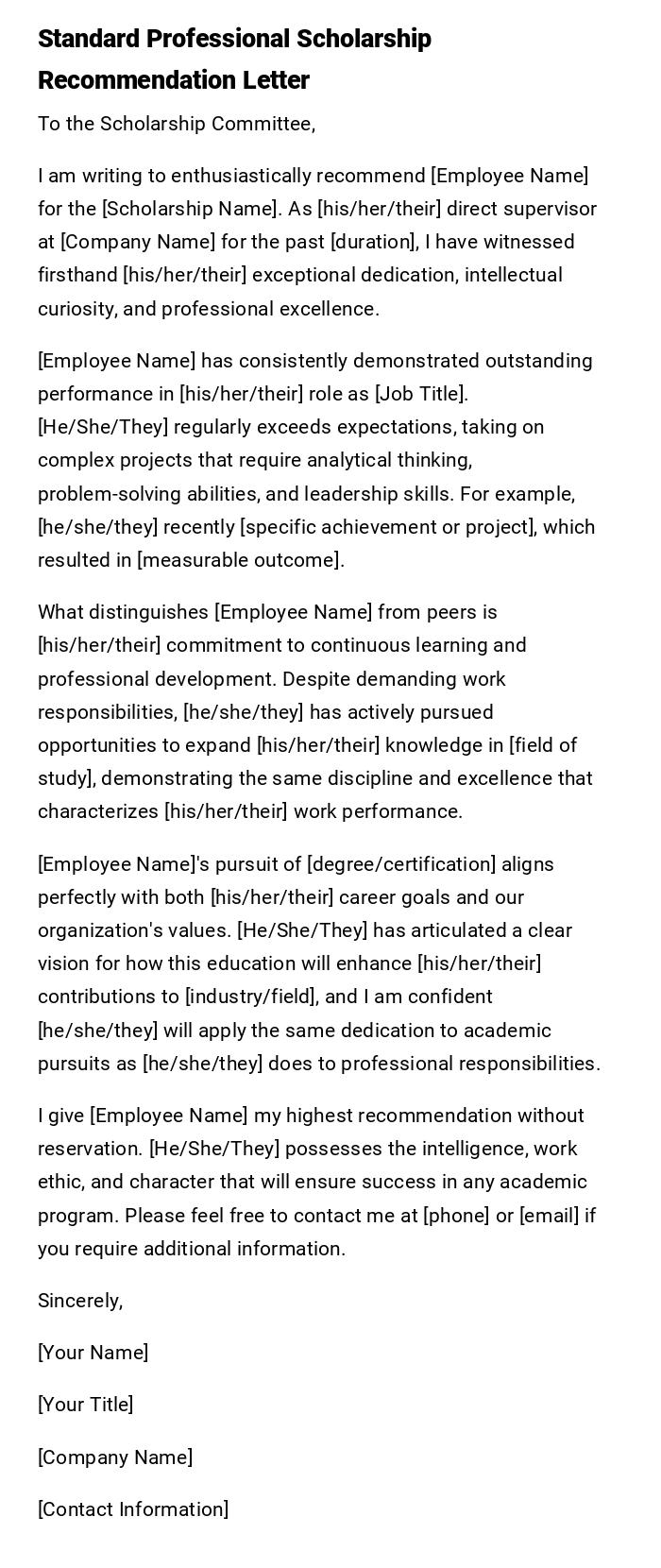
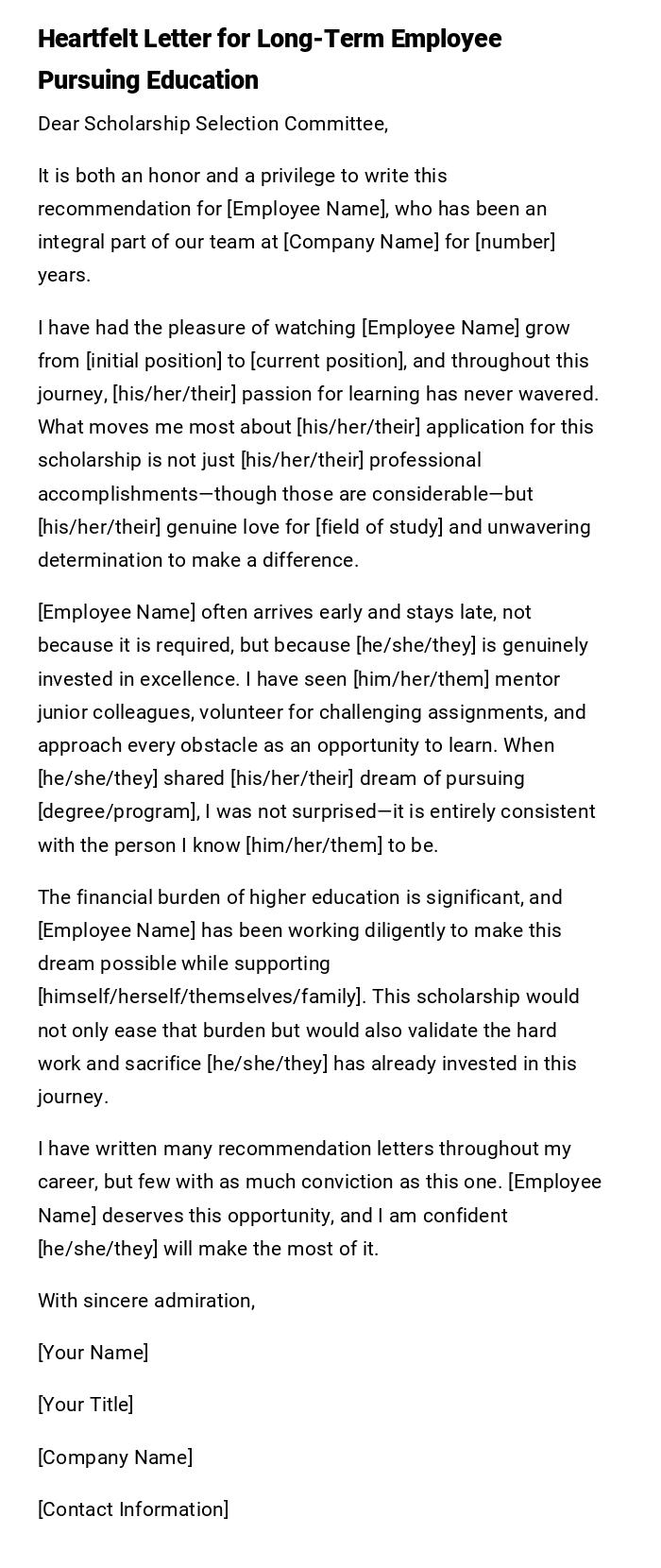
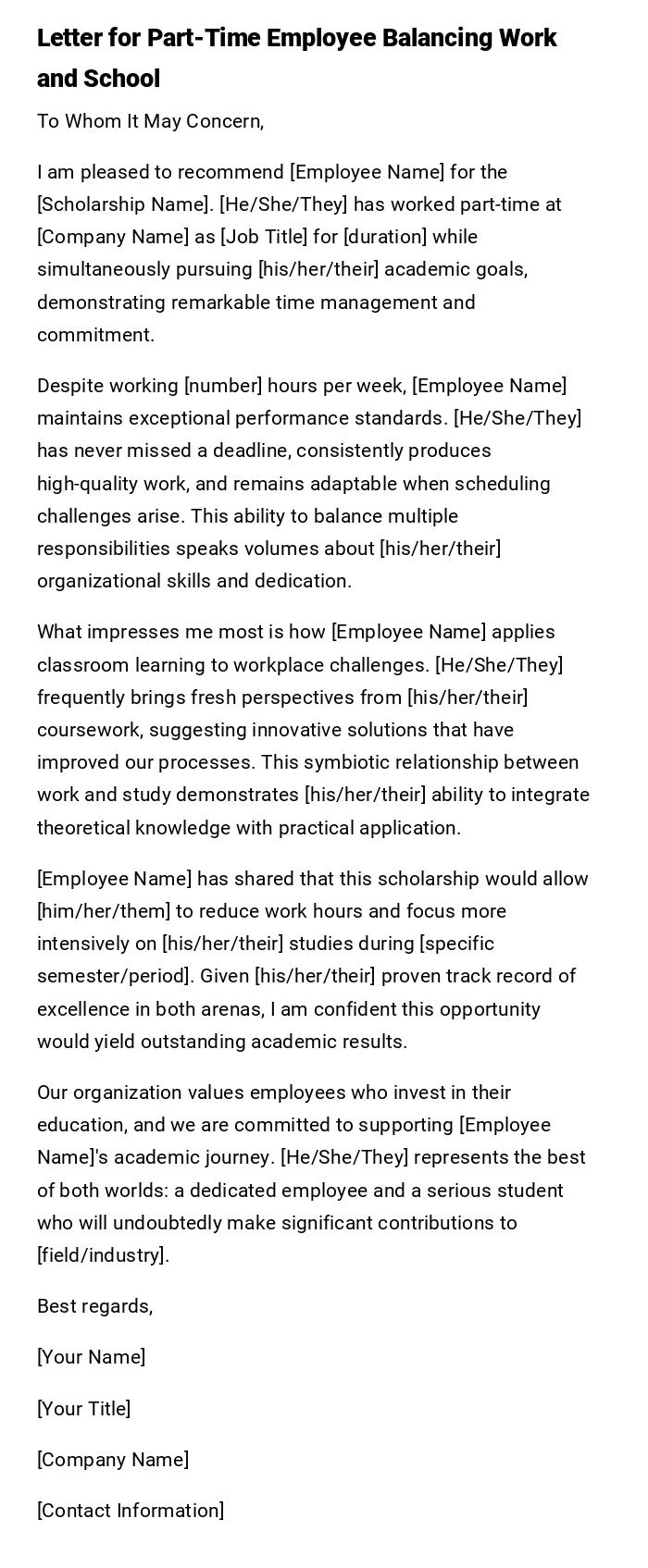
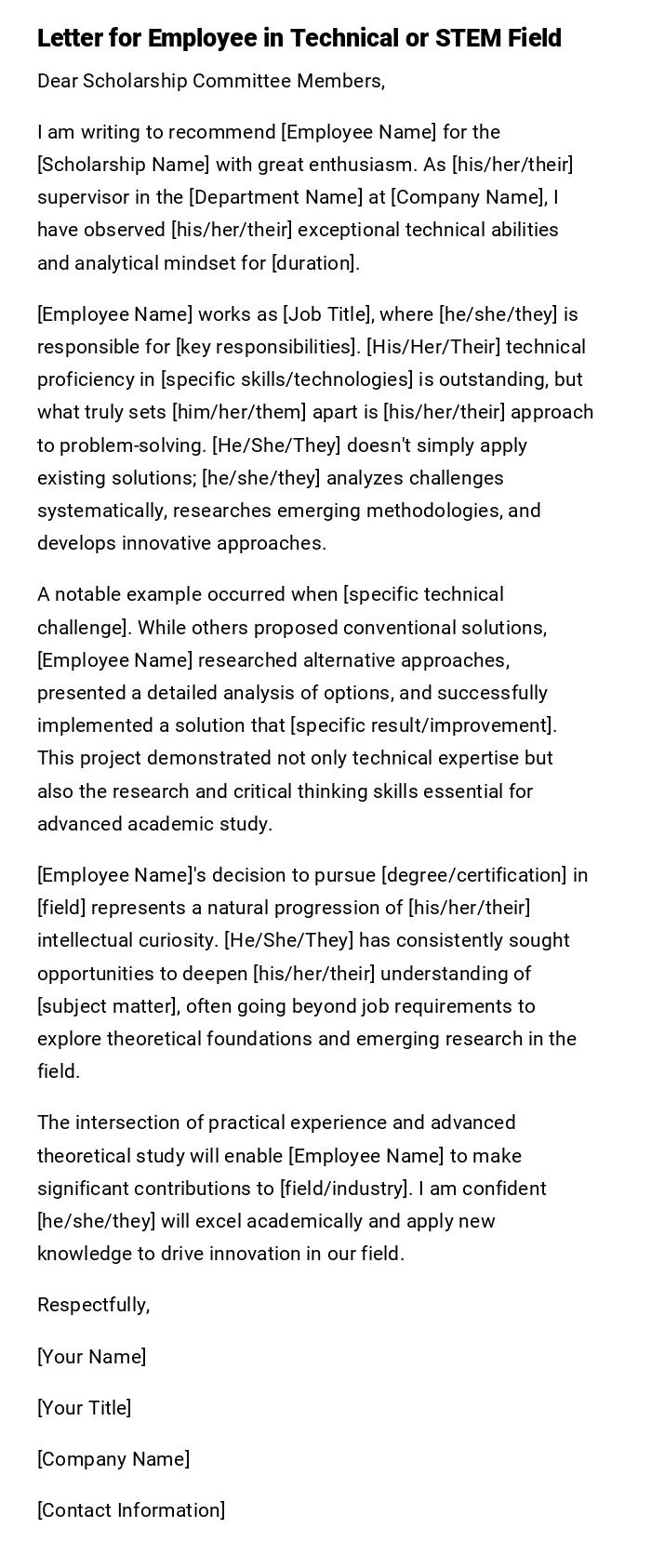
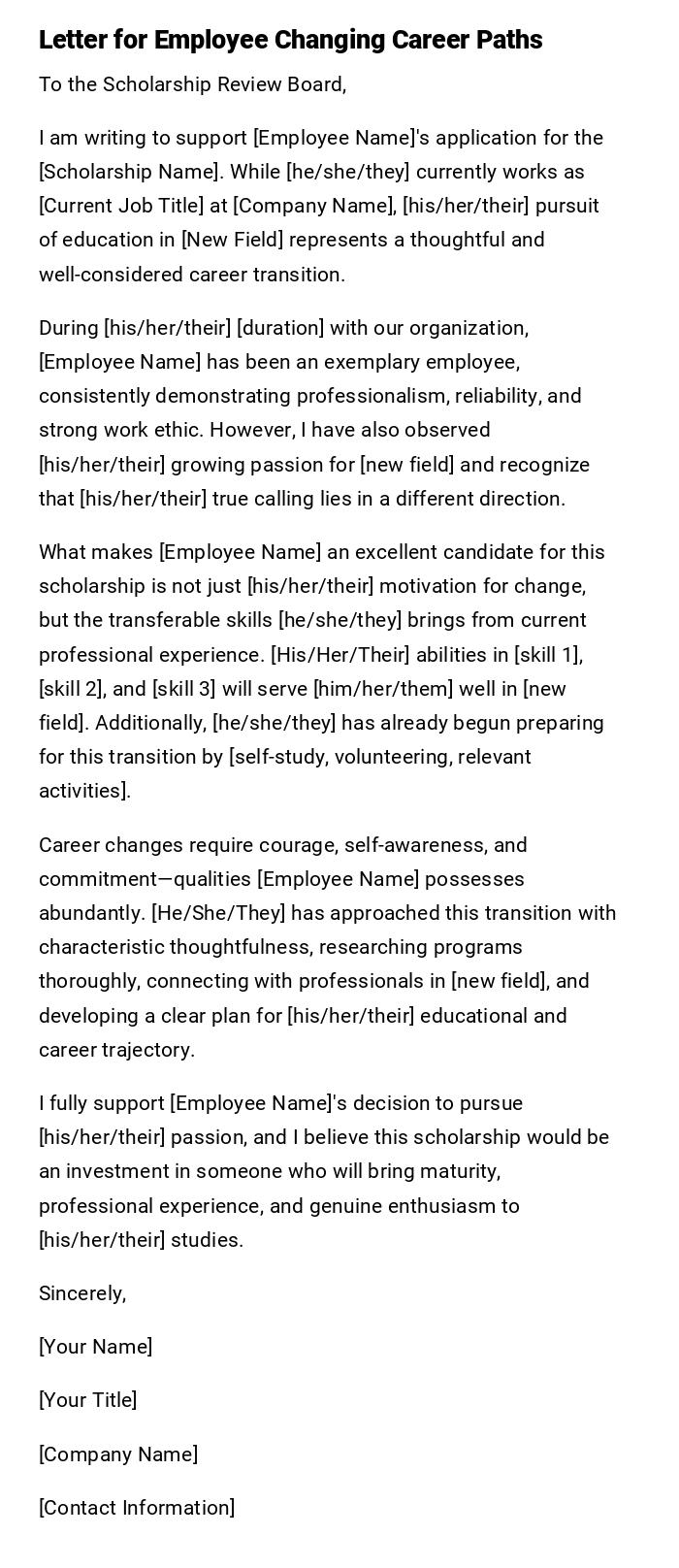
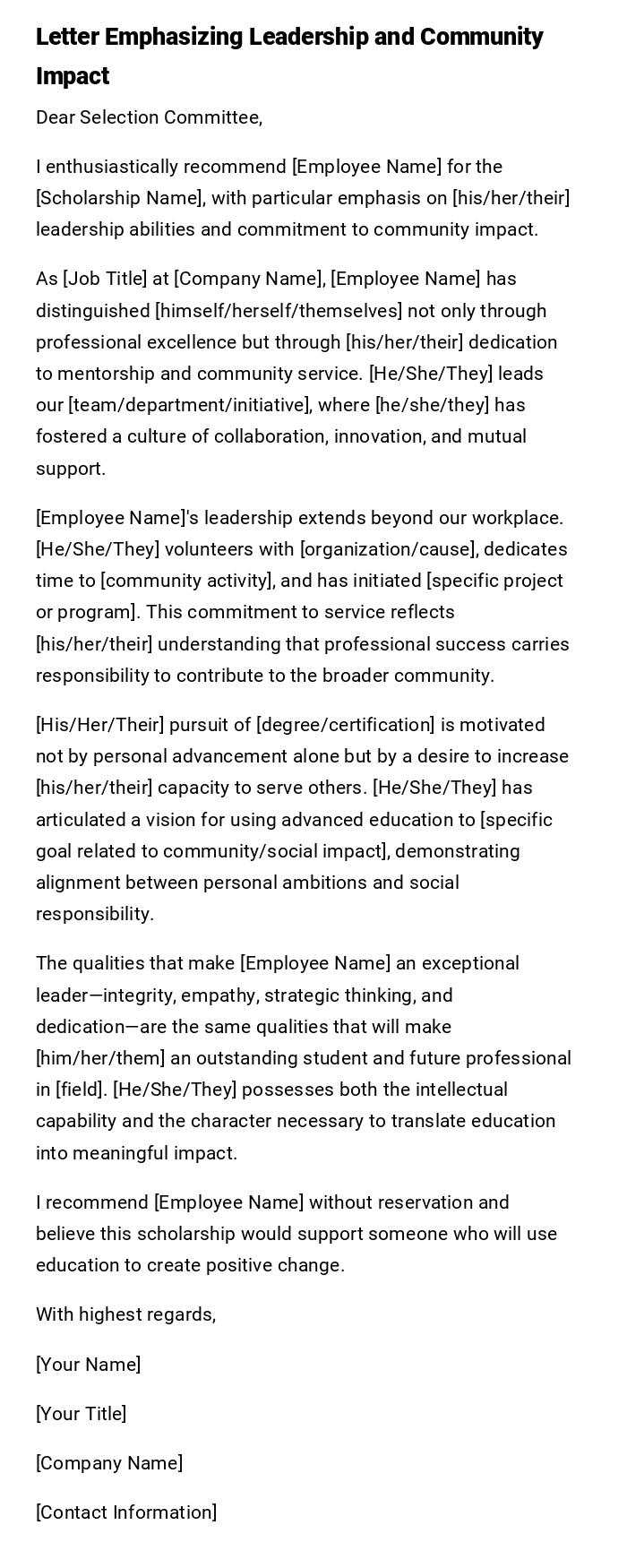
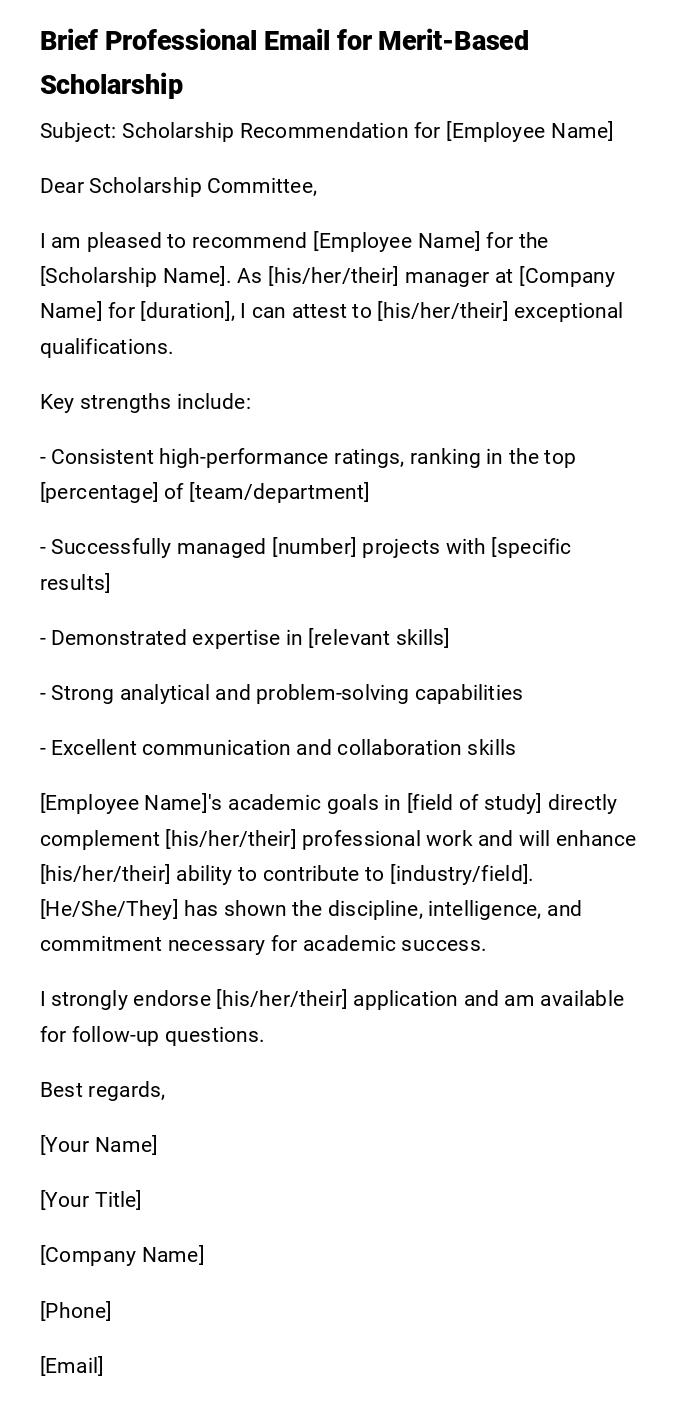
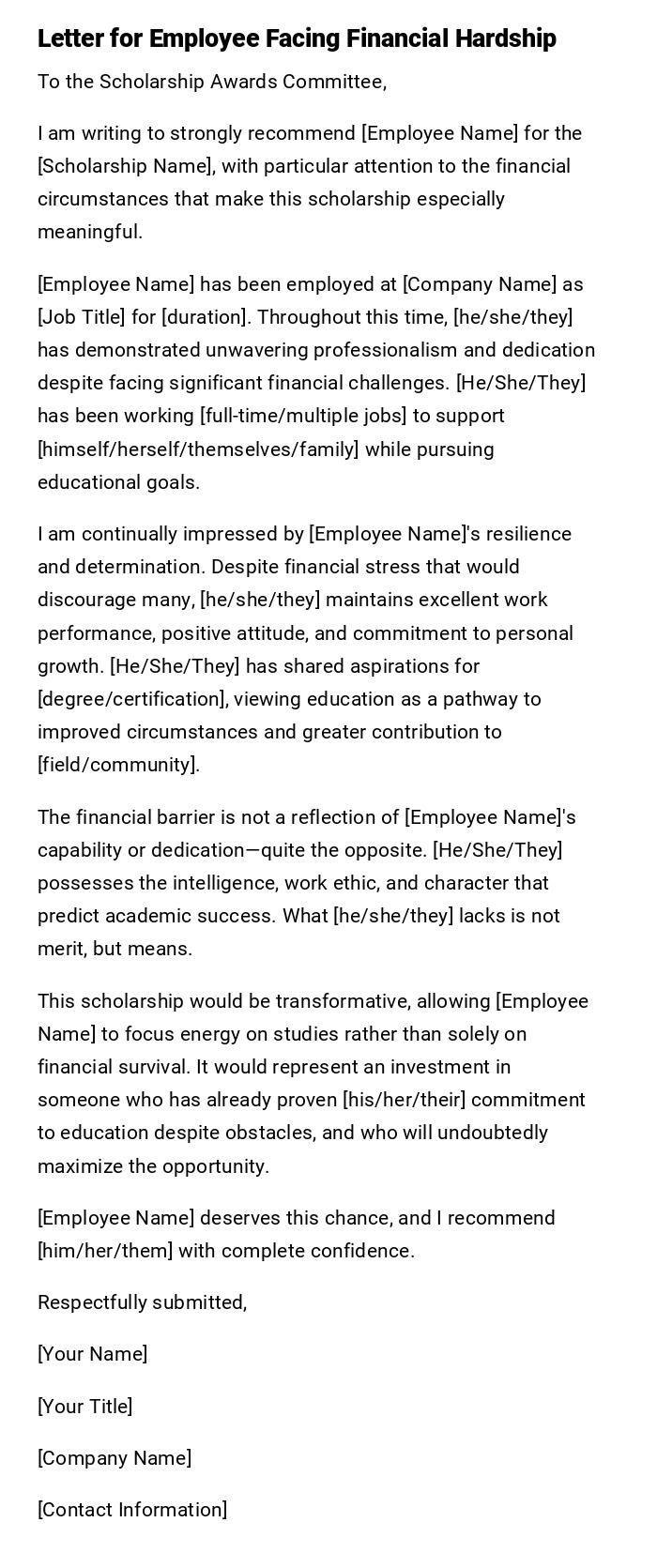

 Download Word Doc
Download Word Doc
 Download PDF
Download PDF